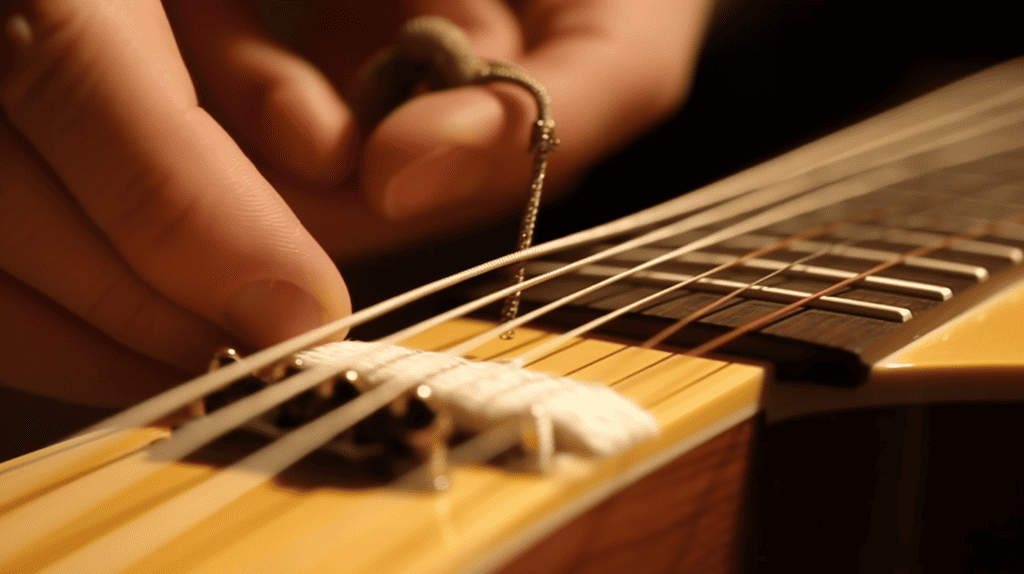Every guitarist knows this moment of acoustic disappointment. You reach for your faithful acoustic guitar, ready to serenade with harmonious strums, only for your ears to be met with an off-key melody. Now you’re left asking, “Why does my acoustic guitar sound bad?”
Hold on to your pick, because we’re about to embark on a harmonious mission to unravel why your guitar sounds off. This blog post will explore the common reasons why an acoustic guitar sounds bad, and more importantly, how to fix them.
Strings: The Heroes of Harmony

Your acoustic guitar sound begins with your guitar strings. They’re the lead singers of your guitar’s sound band. If your guitar sounds bad, the strings could be to blame.
- Vintage Vibes: Old Strings: Aging strings can lose their tonal quality over time, making your acoustic guitar sound dull. If you can’t recall the last time you changed your strings, they’re probably due for a swap.
- Dirty Riffs: Grubby Strings: Dirt and oils from your hands can dull the strings’ vibrations, reducing the sound quality of your guitar. Regular cleaning can keep your strings sounding fresh and prevent your guitar from sounding bad.
- Broken Beats: Damaged Strings: Visible damage like rust or kinks can hinder your guitar’s performance, making the guitar sound tinny or metallic.
Guitar Action: Hitting the Right Note
The ‘action’ of a guitar, the gap between the strings and fretboard, plays a significant role in how your guitar sounds and feels.
- Sky High: High Action: High action can make your guitar sound bad, producing an annoying buzzing sound and making it harder to play.
- Down Low: Low Action: Conversely, low action might cause your strings to buzz against the frets, creating a poor sound quality.
Adjusting the truss rod, saddle, and guitar’s nut can fine-tune the action. But if you’re not comfortable with these adjustments, better leave it to a professional guitar tech.
Setting Your Guitar Straight: The Sweet Symphony of Intonation
Have you ever experienced a guitar sounding weird, where open strings sound perfect but fretted notes sound off? That’s a classic case of poor guitar intonation. Often caused by strings not being in harmony with your guitar’s scale length, this could make your guitar sound out of tune. But don’t panic – a guitar technician can adjust your guitar’s saddle and restore balance.
Guitar Anatomy 101: Beware of the Physical Pitfalls
A small hiccup in your guitar’s body can lead to a large impact on your overall sound. Keep an eye out for these potential issues:
- The Inside Story: Loose Bracing: Just like bones, the bracing inside your guitar helps maintain its shape and sustain its tone. Loose braces can cause a rattling sound or an annoying buzz.
- The Scars of Time: Cracks in the Wood: Cracks, caused by changes in humidity or accidental damage, can reduce your guitar’s tone and sustain and might even cause the guitar to sound bad.
- Bent Out of Shape: Warped Neck: A warped guitar neck, from truss rod adjustments or humidity changes, can cause fret buzz.
If you spot these issues, consider getting professional help from a guitar technician.
The Unseen Puppeteers: The Effects of Temperature and Humidity

Often overlooked, changes in temperature and humidity can significantly influence your guitar’s structural integrity and sound quality. Sudden shifts in temperature can lead to the wood expanding or contracting, causing potential cracks or structural damages. High or low humidity levels can destabilize your guitar, causing the wood to swell or dry out, respectively. Preserving the right moisture levels is vital in maintaining your acoustic guitar’s health.
Playing Techniques: You’re the Captain of this Ship
Remember, your guitar can only sound as good as you play it. Sometimes, the culprit behind your guitar sounding bad is not mechanical but due to unpolished playing techniques. Both pressing too hard or too softly on the strings can affect the sound quality of your acoustic guitar. Regular practice or guitar lessons can help improve your playing style and your guitar’s sound.
Demystifying the Sound: Exploring the Soundhole, Strings, and Nut Materials
The acoustic guitar is a puzzle, with pieces like the soundhole, strings, and nut materials all playing roles in creating your guitar’s unique sound.
Soundhole: The Grand Auditorium of the Acoustic Guitar
The soundhole of your acoustic guitar is akin to a grand auditorium where the guitar’s sound is given its big debut. But what happens when this grand auditorium’s doors are jammed? That’s similar to what occurs when your guitar soundhole is blocked, muffling the guitar’s sound quality, making it sound as if your guitar sounds bad or shy. Using feedback busters or soundhole covers can be beneficial during amplification or when you’re attempting to keep your acoustic guitar sounds to a minimum. But remember, these tools can drastically impact the overall sound of your acoustic guitar. And never underestimate the value of a clean soundhole for optimal sound projection.
String Type: The Great Debate – Steel Strings vs. Nylon
The type of guitar strings on your acoustic guitar greatly influences the guitar’s overall tone. Steel strings can make your guitar sound bright and loud with more sustain, perfect for genres like rock, country, and folk music. On the other hand, nylon strings produce a softer, mellower tone typically associated with classical guitar music. Just like you wouldn’t use a heavy oil brush on a delicate watercolor painting, remember not to put steel strings on a guitar designed for nylon strings and vice versa, to prevent unnecessary damage and poor sound quality.
Nut Material: Small Piece, Big Impact on Guitar Sound
The nut of the guitar, though small, significantly impacts your guitar’s sound. Different materials can lend unique tonal characteristics to your guitar sound. For instance, a bone nut adds a brighter tone, while synthetic materials might make your guitar sound more muted. If the guitar nut is worn or improperly slotted, it could lead to a guitar sounding dull, cause buzzing, muted notes, or poor intonation. A replacement or fix by a guitar technician can get it back in action and improve the guitar sounds.
The Room: The World is Your Stage

Finally, the stage where your acoustic guitar performs – the room – can also influence your guitar’s sound quality. A small, carpeted room might absorb sound, making your acoustic guitar sound subdued. In contrast, a large room with hard surfaces can mimic the sound qualities of an electro-acoustic guitar, adding depth and natural reverb to your sound.
Stay in Tune: Mastering Your Acoustic Guitar’s Melodic Language
Every acoustic guitar has its own melodic language, and tuning is akin to mastering the guitar’s musical dialect. Without accurate tuning, your guitar might sound more like a cacophony rather than a harmonious symphony. Routine tuning ensures that your guitar hits the right notes and delivers an optimal performance, a classic “dial-in” trick for any musician.
- Standard Tuning: A guitar not in sync with the standard E A D G B E pitches can sound off-key and jarring. Make use of a digital tuner or a reliable tuning app to maintain the tempo and keep your guitar in harmony with your musical creativity.
- Experimenting with Sound: Alternate Tunings: At times, for a distinct musical composition, you might need to delve into alternate tunings. However, if you’re not attuned to the nuances, it can make the sound feel alien. Like strumming a folk song expecting a blues rhythm.
- Taming the New Strings: Much like a new band member, new strings need some time to settle in. In the beginning, frequent tuning will be necessary until the strings adjust and stay in tune.
Amplifying Your Acoustic Guitar Sound: Diving Deeper than the Basics
The realm of guitar sound is vast and varied, and this blog post is a mere beginner’s guide. Every guitar is unique, possessing its own character and tone, and what works for one might not suit another. Your journey in understanding and improving your guitar’s sound will require knowledge, patience, and a willingness to experiment – like trying out various guitar picks to find the perfect fit for your playstyle.
To conclude, if you’ve found yourself asking, “why does my acoustic guitar sound bad?” remember that the path to the solution isn’t daunting. By understanding the different components of your guitar and their role in sound production, you can conduct a thorough inspection to diagnose and rectify any issues, restoring the harmonious resonance of a well-tuned guitar to your musical performances. As a musician, you’re constantly learning and making new discoveries. So, embrace this journey and let your passion for music guide you. Here’s to creating many more beautiful melodies with your acoustic guitar!
Frequently Asked Questions
1. Q: How often should I change my acoustic guitar strings?
A: Generally, you should consider changing your strings every 3 months or after 100 hours of use. However, this can vary based on how often you play, your playing style, and the type of strings used.
2. Q: My guitar’s action is too high. Can I adjust it myself?
A: Adjusting the guitar’s action involves tweaking the truss rod, saddle, and nut. While it’s possible to do this yourself, it’s generally recommended to seek the help of a professional luthier, especially if you’re not experienced in guitar maintenance, to avoid damaging the instrument.
3. Q: How can I tell if my guitar’s intonation is off?
A: A simple way to check your guitar’s intonation is by playing a harmonic at the 12th fret and then playing the actual note at the 12th fret. If these two notes are not the same, your guitar’s intonation may be off.
4. Q: What does it mean when my guitar is out of tune with itself?
A: If your guitar is out of tune with itself, it means that while the open strings might tune perfectly, the fretted notes will sound sharp or flat. This is a common indication of improper intonation.
5. Q: How does the room I’m playing in affect my guitar’s sound?
A: The room’s acoustics can significantly affect your guitar’s sound. Small, carpeted rooms can absorb sound, making your guitar seem quieter, while larger rooms with hard surfaces can amplify and add natural reverb to your sound.
6. Q: Can I put steel strings on a guitar designed for nylon strings, or vice versa?
A: No, you should never put steel strings on a guitar designed for nylon strings or vice versa. The tension differences can severely damage the guitar.
7. Q: How do temperature and humidity affect my guitar?
A: Rapid changes in temperature can cause the wood of your guitar to expand or contract, potentially causing cracks or other structural issues. Both high and low humidity levels can also negatively impact your guitar, causing the wood to either dry out and crack or to swell and warp.
8. Q: Why does my guitar sound different even after I’ve addressed all these issues?
A: Every guitar has its unique voice, affected by its age, construction, type of wood, and how it’s been played and maintained over time. Your acoustic guitar might not sound bad, but just different from what you’re used to hearing or what you expect. Understanding your guitar’s unique voice is part of the journey of a guitarist.
